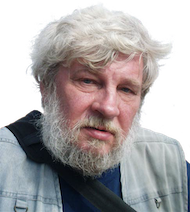East and resources: from Antiquity to the Present [Review on:] Alexander M. Etkind. The Nature of evil. Raw materials and the state. Moscow: New Literary Review; 2020. 504 p.
Abstract
The focal point of the book under review is Europe as well as its interaction on the level of supply of resources with other regions of the world, primarily with the East. The author expands the usual notion of the “East”. He extends its boundaries to the regions, which supplied Europe with resources, starting with the actual East and extending it to the European North and even America. The author identifies a change in the main types of resources supply, from the wood and other commodities followed by luxury goods and energy carriers. The author shows a special interest in the influence of resource exchange on social processes in Europe and the East, as well as the formation of European academic economic thought. He also pays special attention to environmental problems related to the resource economy.
Keywords
About the Author
Lev S. PerepiolkinRussian Federation

Lev S. Perepelkin ‒ Ph. D. (Hist.), Senior Research Fellow, Center for Central Asian and Caucasus Studies
Moscow
Competing Interests:
The author declares that there is no conflict of interest.
References
1. Diamond J., Robinson J. (eds) Natural experiments in history. Moscow: AST; 2017. 352 p. (In Russ.)
2. Evteev S. A., Perelyot R. A. (eds) Our common future. Report of the International Commission on Environment and Development (ICSID). Moscow: Progress; 1989. 376 p. (In Russ.)
3. Meadows D. H., Meadows D. L., Renders J., Behrens V. V. Limits of growth. Moscow: MSU Publishing House; 1991. 207 p. (In Russ.)
4. Skinner B. Will there be enough Earth resources for humanity? Moscow: Mir; 1989. 264 p. (In Russ.)
5. Kapitsa S. P. General theory of human growth. How many people have lived, live and will live on Earth. Moscow: Nauka; 1999. 190 p. (In Russ.)
6. Kapitsa S. P. The Hyperbolic path of humanity. Through the Demographic Revolution to Knowledge Societies. Moscow: TONCHU Publishing House; 2009. 128 p. (In Russ.)
7. Frankopan P. The Silk road. The road of fabrics, slaves, ideas and religions. Moscow: Eksmo, 2019. 864 p. (In Russ.)
8. Bertness M. Brief natural history of civilization. Moscow: AST, 2020. 384 p. (In Russ.)
9. Etkind A. M. The nature of Evil. Raw materials and the state. Moscow: New Literary Review, 2020. 504 p. (In Russ.)
10. Said E.W. Orientalism. Western concepts of the East. St. Petersburg: Russian world, 2006. 637 p. (In Russ.)
11. Metten G. West-Russia: the thousand-year war. History of Russophobia from Charlemagne to the Ukrainian crisis. Moscow: Paulsen; 2016. 500 p. (In Russ.)
12. Bobrovnikov V. O., Miri S. J. (eds) Orientalism vs. the Oriental studies. Digest of articles. Moscow: Sadra; 2016. 440 p. (In Russ.)
13. Miri S. J., Bobrovnikov V. O. Introduction. Bobrovnikov V. O., Miri S. J. (eds) Orientalism vs. the Oriental studies. Digest of articles. Moscow: Sadra; 2016. Pp. 7–15. (In Russ.)
14. Panarin S. A. (ed.) The East in the East, in Russia and in the West: cross-border migrations and diasporas. St. Petersburg: Nestor-Istoriya; 2016. 304 p.
15. Volkov A. V. Neanderthals. Other humanity. Moscow: Veche; 2020. 352 p.
16. Solov’eva Z. A., Filonik A. O. (eds) The arab world: contrasts of water balance. Moscow: IV RAN; 2018. 412 p.
17. Perepelkin L. S. Russia and its civilizational future: winning positions (the view of an anthropologist). Reznik Yu. M. (ed.) Questions of Social Theory. The scientific almanac. Vol. XII: Russia as a civilization of the future. Moscow: Institute philosophiyi; 2020, pp. 172–186.
18. Vlasova O., Kalyanina L., Koksharov A., Rubanov I. Who will feed the planet. Expert. 2008;(16):28–31.
19. Polyakov S. P. Household consumption of drug-containing products as an element of traditional culture of the population of Central Asia. In: Larina E. I. (comp.) In memory of Professor S. P. Polyakov. Collection of unpublished works. Moscow: ST-Print; 2012, pp. 83–85.
20. Saprykin I. How to turn the Sahara and Australia into energy “emirates”. NG-nauka. 2020. Nov. 11, p. 12.
21. Mechanic A. On hydrogen in the future. Expert. 2020;(51):34–38.
22. Makarov A. A., Mitrova T. A., Kulagin V. A. (eds.) Forecast of energy development in the world and Russia 2019. Moscow: INEI RAS – Moscow School of Management SKOLKOVO; 2019. 210 p.
23. Bykova N. What we will share on the Moon. Expert. 2020;(49):44–49.
24. Veblen T. The theory of the leisure class. Moscow: Progress; 1984. 368 p.
25. Castels M. Infomational epoch: economy, Society and Culture. Moscow: Higher School of Economics; 2000. 608 p.
Supplementary files

|
1. Supplementary files_Orientalistica-Peer review info-East and resources | |
| Subject | ||
| Type | Other | |
Download
(210KB)
|
Indexing metadata | |
For citation:
Perepiolkin L.S. East and resources: from Antiquity to the Present [Review on:] Alexander M. Etkind. The Nature of evil. Raw materials and the state. Moscow: New Literary Review; 2020. 504 p. Orientalistica. 2021;4(1):262-286. (In Russ.) https://doi.org/10.31696/2618-7043-2021-4-1-262-286






















